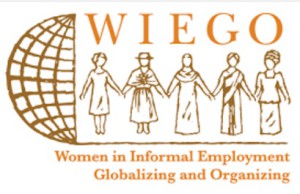…. HUMAN RIGHTS ….
An article from WIEGO, Women in Informal Employment Globalizing and Organizing
On February 8th and 9th, 2015, nearly 100 home-based worker representatives and supporters from 24 countries took part in a first-of-its kind global meeting in New Delhi, India, to draft and adopt the Delhi Declaration of Home-based Workers. The group also devised a five-year Action Plan to improve conditions for millions of home-based workers around the globe.

The two-day event was organized by Women in Informal Employment Globalizing and Organizing (WIEGO) and HomeNet South Asia (HNSA) to provide a platform for home-based workers, who are primarily economically and socially disadvantaged women, to build solidarity, share experiences and learnings and move toward unified action with the Declaration and five-year Plan.
Supported by WIEGO and HomeNet South Asia, participants worked collaboratively to formulate the Delhi Declaration and adopted it in the presence of honourable guests, Ms. Roberta Clarke, Regional Director, UN Women, Asia Pacific, and Ms. Devaki Jain, a well-known development economist.
“The home-based worker movement started 20 years ago,” says Chris Bonner, Director, Organization & Representation Program, WIEGO. “It’s been a difficult and slow process, but today’s achievements are really significant.”
The Delhi Declaration of Home-based Workers declares a commitment to supporting, building and strengthening related organizations and calls for the following key points to improve the lives of home-based workers:
Recognition of home-based workers as workers and as women who contribute significantly to improving their family’s income security and to the local and national economies;
Formulation and implementation of social protection and labour laws to live free from discrimination, poverty and depravation;
Systematic collection of data on home-based workers;
Recognition of rights to freedom of association and collective bargaining;
Building better and inclusive markets;
Formulation of effective local and national policies on home-based workers;
Extending social protection schemes and interventions to home-based workers;
Provision of essential urban infrastructure services to home-based workers;
Ratification of the International Labour Organization Home Work Convention, 1996 (no. 177).
(Article continued on right side of page.)
(Article continued from left side of page.)
The 60 organizations present also devised a five-year action plan to ensure implementation of the Declaration in the regions present, including Latin America, Africa, Eastern Europe, South Asia and Southeast Asia.
“I celebrate with you down a common road of equality and justice for all,” said Clarke. “We will stand with you and strengthen partnerships. We will stand with you in advocacy.”
About HomeNet South Asia
HNSA is the regional network of organizations of home-based workers. It currently has a presence in eight countries of South Asia. It works towards building regional solidarity among home-based workers, especially women workers, and empowering them to lead a life of dignity, free of poverty, by obtaining decent work and social protection, within a rights based framework.
See http://www.homenetsouthasia.net
About Women in Informal Employment Globalizing and Organizing
WIEGO is a global action-research-policy network that seeks to improve the status of the working poor, especially women, in the informal economy: through stronger organizations, better data and research, and fairer policies and regulations. Visit http://www.wiego.org
For more information or to interview organizers, home-based workers or researchers, please contact:
Shalini Sinha, Home-based Worker Sector Specialist, WIEGO, at +91-9810111368 or shalini.sinha(at)wiego(dot)org
Firoza Mehrotra, Director Programmes, HomeNet South Asia, at +91-9958323674 or mehrotrafiroza7(at)gmail(dot)com